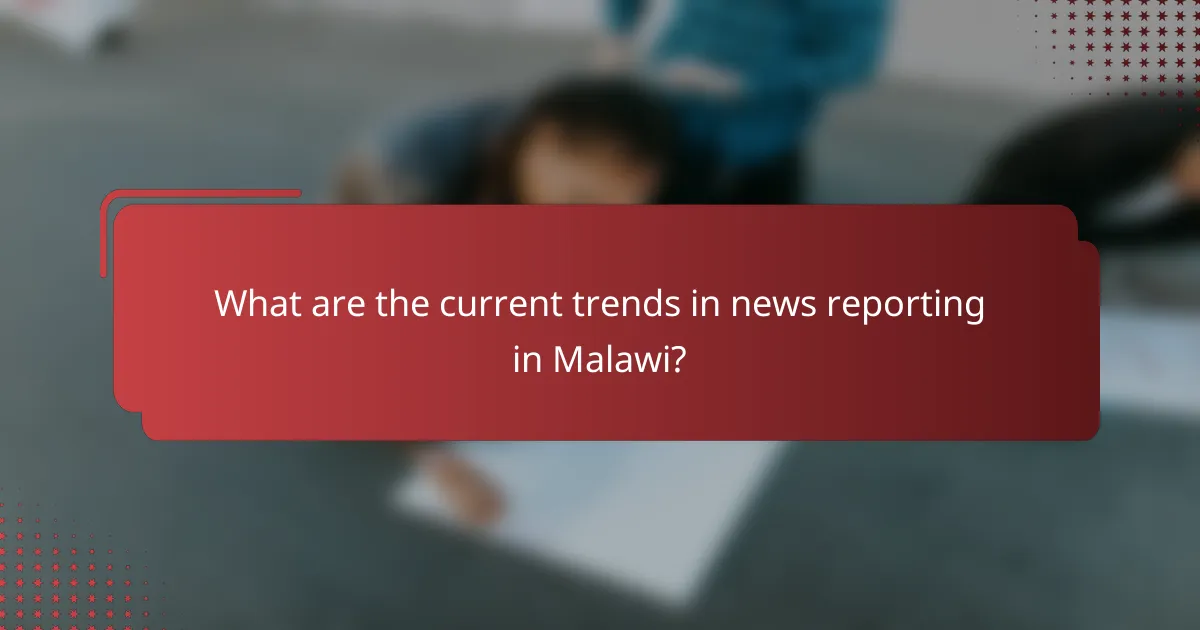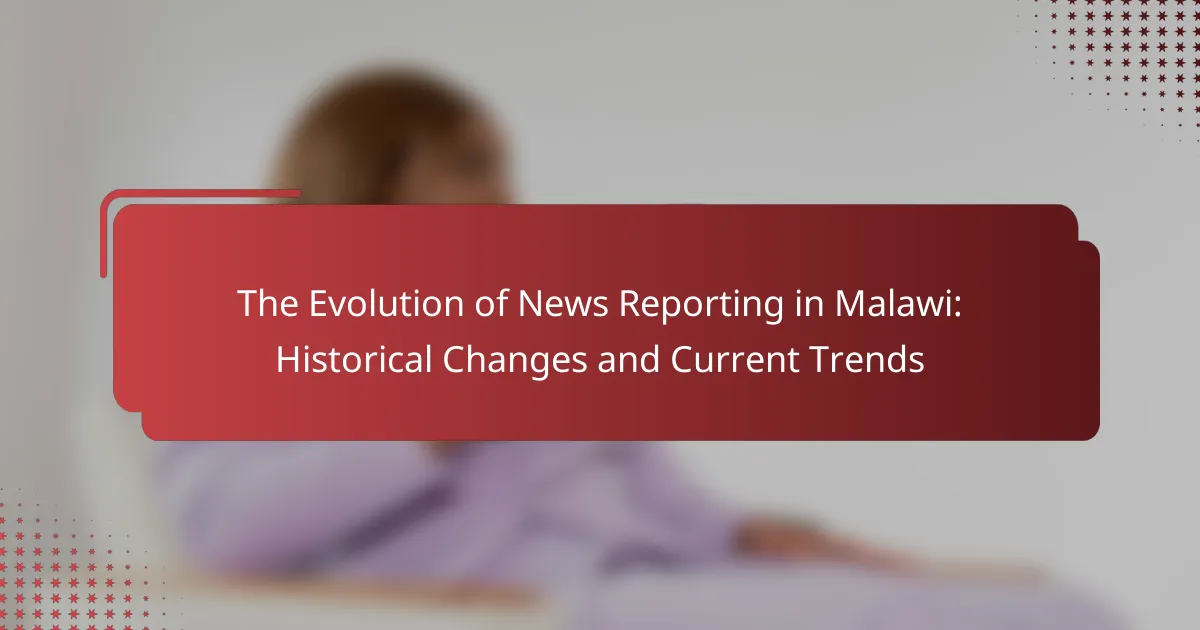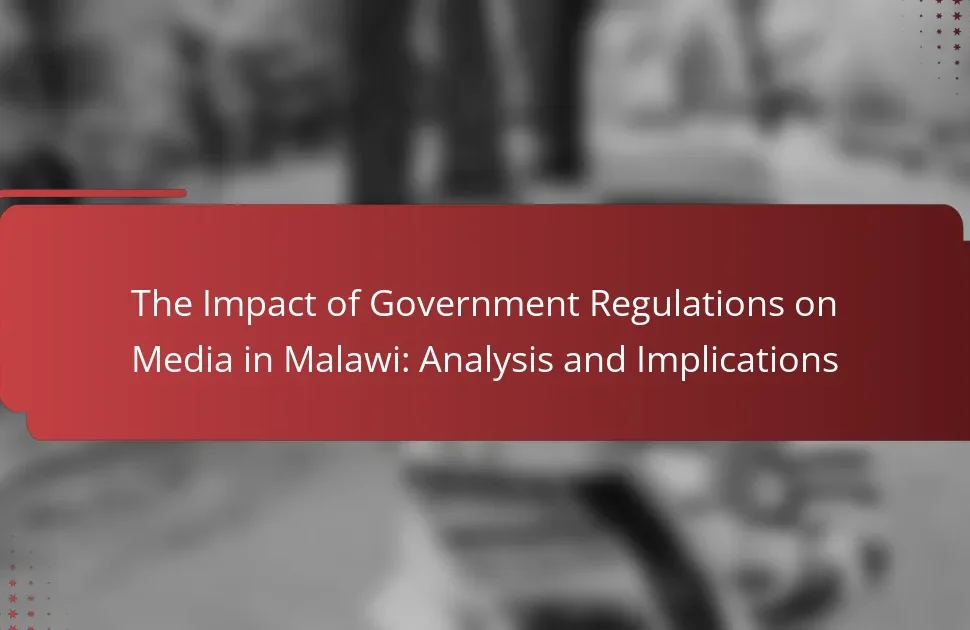The article examines the evolution of news reporting in Malawi, highlighting significant changes since the country’s independence in 1964. Initially characterized by government control under a one-party state, the media landscape transformed in the 1990s with the introduction of a multiparty system, leading to the rise of private media outlets and newspapers. The advent of the internet and social media has further reshaped news dissemination, making information more accessible and engaging for audiences, particularly the youth. Current trends indicate a shift towards digital platforms, a decline in traditional print media, and an emphasis on investigative journalism and citizen reporting. Challenges such as misinformation and the need for enhanced media literacy remain critical as the future of news reporting continues to evolve in Malawi.

What is the Evolution of News Reporting in Malawi?
The evolution of news reporting in Malawi has undergone significant changes since the country’s independence in 1964. Initially, news reporting was heavily controlled by the government under a one-party state. The Malawi Broadcasting Corporation was the sole broadcaster, limiting diverse perspectives. In the 1990s, political reforms led to the introduction of a multiparty system. This shift allowed for the emergence of private media outlets. Newspapers like The Nation and The Daily Times began to flourish during this period. The advent of the internet in the 2000s further transformed news reporting. Online platforms provided alternative sources of information and increased accessibility. Today, social media plays a crucial role in disseminating news. It allows for real-time reporting and engagement with audiences. Overall, news reporting in Malawi has evolved from state-controlled to a more pluralistic and dynamic landscape.
How has news reporting changed in Malawi over the decades?
News reporting in Malawi has evolved significantly over the decades. Initially, news was primarily disseminated through state-controlled media. This limited the diversity of viewpoints and information available to the public. In the 1990s, Malawi transitioned to a multiparty democracy. This shift led to an increase in independent media outlets. The rise of radio and television further diversified news sources. Digital platforms have since transformed news consumption, allowing for real-time reporting. Social media now plays a crucial role in shaping public discourse. Despite challenges like censorship and political pressure, Malawian journalism continues to adapt and grow.
What were the key historical milestones in Malawian news reporting?
The key historical milestones in Malawian news reporting include the establishment of the first newspaper, the Nyasaland Times, in 1895. This marked the beginning of print journalism in Malawi. In 1964, Malawi gained independence, leading to the formation of state-controlled media. The Malawi Broadcasting Corporation was established in 1964, becoming the primary broadcaster. In 1993, Malawi transitioned to multiparty democracy, resulting in increased press freedom. The 1995 Constitution guaranteed freedom of expression and the right to access information. In 2000, the Media Council of Malawi was formed to promote ethical journalism. The rise of online news platforms began in the early 2000s, diversifying news sources. These milestones collectively shaped the landscape of news reporting in Malawi.
How did colonialism influence news reporting in Malawi?
Colonialism significantly influenced news reporting in Malawi by introducing Western-style journalism. During the colonial period, the British established a press that primarily served colonial interests. This press often suppressed local voices and prioritized colonial narratives. The colonial government controlled news content, limiting coverage of indigenous issues. Additionally, the introduction of English as the primary language of reporting marginalized local languages. This led to a lack of representation for Malawian perspectives in the media. Consequently, colonialism shaped a media landscape that favored colonial powers over local communities. The legacy of these practices can still be observed in contemporary news reporting in Malawi.
What role does news reporting play in Malawian society?
News reporting plays a crucial role in Malawian society by informing the public about current events and government activities. It serves as a platform for accountability, enabling citizens to hold leaders responsible. News outlets provide critical coverage of social issues, health, and education, influencing public opinion and policy. In Malawi, radio remains the dominant medium, with over 80% of the population accessing information this way. Print media and online platforms are also significant, particularly among urban populations. Journalists often face challenges, including censorship and threats, which can impact the quality of reporting. Despite these challenges, news reporting remains vital for democracy and civic engagement in Malawi.
How does news reporting contribute to democracy in Malawi?
News reporting contributes to democracy in Malawi by promoting transparency and accountability. It informs citizens about government actions and policies. This information empowers the public to engage in political discourse. Additionally, news reporting serves as a watchdog against corruption. It highlights issues that may otherwise remain hidden. In Malawi, independent media outlets play a crucial role in this process. They provide diverse viewpoints and facilitate public debate. This fosters an informed electorate, essential for a functioning democracy. Studies show that countries with robust media freedom have higher democratic engagement.
What are the cultural impacts of news reporting in Malawi?
News reporting in Malawi significantly influences cultural awareness and social consciousness. It shapes public opinion on vital issues such as governance, health, and education. Reports on local traditions and events promote cultural heritage and identity. Furthermore, news coverage fosters dialogue on social issues, encouraging community engagement. The media serves as a platform for diverse voices, enhancing democratic participation. Research shows that increased access to news correlates with heightened civic involvement among Malawians. Overall, news reporting plays a crucial role in reflecting and shaping the cultural landscape of Malawi.

What are the current trends in news reporting in Malawi?
Current trends in news reporting in Malawi include a shift towards digital media platforms. Traditional print media is declining in readership and influence. Online news outlets are gaining popularity among younger audiences. Social media is increasingly used for news dissemination and engagement. There is a growing emphasis on investigative journalism to address corruption and governance issues. Citizen journalism is also rising, allowing ordinary people to report news. Local languages are being incorporated to reach broader audiences. The demand for fact-checking and reliable information is increasing amid misinformation challenges.
How has technology influenced news reporting in Malawi today?
Technology has significantly influenced news reporting in Malawi today. The rise of mobile phones has enabled journalists to gather and share news quickly. Social media platforms have expanded the reach of news outlets, allowing for real-time updates. Digital journalism tools have improved the quality of reporting through better editing and fact-checking. Internet access has increased, facilitating broader audience engagement with news content. According to the Malawi Communications Regulatory Authority, mobile subscriptions have reached over 10 million, enhancing communication among reporters. Additionally, online news platforms have emerged, providing alternative sources of information. These developments have made news reporting more immediate and accessible to the public.
What digital platforms are popular for news consumption in Malawi?
Social media platforms are popular for news consumption in Malawi. Facebook and WhatsApp are widely used for sharing news and updates. Local news websites also play a significant role. Platforms like Nyasa Times and Malawi24 are frequently visited for news content. Mobile apps for news services are gaining traction as well. The increasing smartphone [censured] in Malawi facilitates this trend. According to a 2021 report by the Malawi Communications Regulatory Authority, internet usage in Malawi has grown, enhancing digital news access.
How has social media changed the landscape of news reporting?
Social media has fundamentally transformed news reporting by enabling real-time information dissemination. It allows journalists to share breaking news instantly with a global audience. Platforms like Twitter and Facebook have become primary sources for news updates. They facilitate direct interaction between reporters and the public. This interaction fosters immediate feedback and engagement. Additionally, social media has democratized news creation, allowing anyone to report events. Studies show that over 60% of adults in Malawi use social media for news. This shift has led to an increase in citizen journalism. Consequently, traditional news outlets must adapt to this new landscape to remain relevant.
What challenges does news reporting face in Malawi today?
News reporting in Malawi faces significant challenges today. These include government censorship and restrictions on press freedom. Journalists often encounter intimidation and harassment from authorities. Limited resources and funding also hinder the quality of reporting. The political environment remains unstable, affecting media independence. Additionally, the lack of training for journalists impacts reporting standards. Misinformation and lack of access to reliable information further complicate the media landscape. These factors collectively undermine the integrity and effectiveness of news reporting in Malawi.
How do political pressures affect news reporting in Malawi?
Political pressures significantly affect news reporting in Malawi. Journalists often face intimidation and censorship from government officials. This leads to self-censorship among reporters who fear repercussions. The media landscape in Malawi is influenced by political affiliations of media owners. Reports may be biased towards those in power to maintain access to information. In the past, oppressive regimes have restricted press freedom, impacting the quality of news reporting. According to the 2021 World Press Freedom Index, Malawi ranks 75th out of 180 countries, indicating ongoing challenges. Political pressures create an environment where objective reporting is compromised.
What are the implications of media ownership on news reporting?
Media ownership significantly influences news reporting. It affects editorial decisions, content diversity, and journalistic independence. Concentrated ownership can lead to biased reporting, favoring certain political or corporate interests. For instance, in Malawi, media outlets owned by political figures may prioritize favorable coverage of their affiliates. This ownership structure can limit critical reporting on governance and accountability. Additionally, financial pressures from owners may compromise journalistic integrity, leading to sensationalism or censorship. Studies show that diverse media ownership correlates with higher quality journalism. Therefore, the implications of media ownership are profound, impacting the public’s access to unbiased information.

What is the future of news reporting in Malawi?
The future of news reporting in Malawi is likely to evolve with increased digitalization and access to the internet. As of 2023, mobile phone [censured] in Malawi is over 40%, facilitating access to online news platforms. This trend suggests a shift from traditional print media to digital formats.
Social media platforms are becoming significant sources of news, especially among younger audiences. According to the Malawi Communications Regulatory Authority, social media usage has risen by 30% in the past two years.
Additionally, local news organizations are increasingly adopting multimedia approaches to engage audiences. This includes video content and interactive articles that cater to diverse preferences.
However, challenges such as misinformation and limited media literacy persist. Efforts to enhance journalistic standards and promote fact-checking are essential for the credibility of news reporting in the future.
Overall, the future of news reporting in Malawi will be shaped by technological advancements, audience preferences, and the need for reliable information.
What innovations are emerging in Malawian news reporting?
Emerging innovations in Malawian news reporting include increased use of digital platforms and mobile journalism. News organizations are adopting social media to reach wider audiences. Mobile apps are being developed for real-time news updates. There is a growing trend of citizen journalism facilitated by smartphones. Multimedia storytelling techniques are becoming more common in reporting. Data journalism is also gaining traction, providing analytical insights. Collaborations with tech companies are enhancing reporting capabilities. These innovations reflect a shift towards more accessible and interactive news dissemination in Malawi.
How are local journalists adapting to new reporting methods?
Local journalists are adapting to new reporting methods by leveraging digital platforms and social media. They are using these tools to reach wider audiences quickly. Many journalists are receiving training in multimedia storytelling. This includes skills in video production and podcasting. Journalists are also collaborating with community members for crowd-sourced news. This approach enhances local engagement and relevance. Research indicates that digital literacy is becoming essential for journalists in Malawi. A study by the Malawi Communication and Media Trust highlights these trends. It shows that journalists who embrace technology are more effective in their reporting.
What role will citizen journalism play in the future of news reporting?
Citizen journalism will increasingly serve as a vital supplement to traditional news reporting. It empowers individuals to share real-time information from their communities. This democratization of news allows for diverse perspectives often overlooked by mainstream media. In Malawi, citizen journalism has already played a role in reporting local issues and events. For example, during the 2019 elections, citizens used social media to document irregularities. This immediate feedback loop can enhance accountability among public officials. Furthermore, the accessibility of smartphones facilitates widespread participation in news reporting. As trust in traditional media fluctuates, citizen journalism may fill gaps in coverage. Overall, it is poised to shape the future landscape of news reporting significantly.
What best practices should journalists in Malawi follow?
Journalists in Malawi should adhere to ethical reporting standards. They must verify facts before publication to maintain credibility. Ensuring accuracy helps build trust with the audience. Journalists should respect privacy and avoid sensationalism. This practice protects individuals’ rights and promotes responsible journalism. They must also strive for balanced reporting by presenting multiple viewpoints. This approach fosters a well-informed public. Continuous professional development is essential for adapting to changing media landscapes. Engaging in workshops and training enhances their skills and knowledge. Following these best practices contributes to the integrity of journalism in Malawi.
How can journalists ensure ethical reporting in Malawi?
Journalists in Malawi can ensure ethical reporting by adhering to established journalistic standards and codes of conduct. They should prioritize accuracy, verifying facts before publication. This includes cross-checking information with multiple reliable sources. Journalists must also respect the privacy and dignity of individuals involved in their stories. Sensitivity to cultural contexts is essential in reporting. They should avoid sensationalism and biased language that may misrepresent the truth. Training in media ethics is crucial for journalists to understand their responsibilities. Regular workshops and discussions can reinforce ethical practices. Monitoring bodies should be established to hold journalists accountable for unethical behavior. These measures collectively promote integrity in journalism within Malawi.
What skills are essential for future journalists in Malawi?
Future journalists in Malawi need strong communication skills. Clear writing and speaking are essential for effective storytelling. Critical thinking is also vital for analyzing information. Journalists must understand ethical standards in reporting. Digital literacy is increasingly important in the modern media landscape. Familiarity with social media platforms can enhance audience engagement. Research skills help journalists verify facts and gather reliable information. Adaptability is crucial in a rapidly changing news environment.
The main entity of the article is the evolution of news reporting in Malawi. The article outlines the significant historical changes in news reporting since Malawi’s independence in 1964, including the transition from government-controlled media to a more pluralistic landscape with the rise of private outlets and digital platforms. Key milestones such as the establishment of the first newspaper, the impact of colonialism, and the role of social media are discussed, highlighting how these factors have shaped current trends in journalism. The article also addresses the challenges faced by journalists today, including censorship and political pressures, while emphasizing the importance of ethical reporting and the future role of citizen journalism in Malawi’s media landscape.




